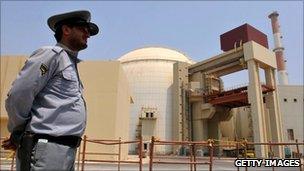Iran arrests 'nuclear spies' accused of cyber attacks
- Published

The Stuxnet worm affected staff computers at Iran's Bushehr power station
Iran has arrested "nuclear spies" on suspicion of being behind cyber attacks on its nuclear programme, Iranian state media report.
Press TV says "a number" of people have been apprehended as part of an operation by Iran to counter "massive enemy schemes".
The report comes after the complex worm Stuxnet infected staff computers at Iran's first nuclear power station at Bushehr.
No details of the arrests were given.
'Destructive moves'
Iranian Intelligence Minister Heidar Moslehi was cited by Press TV as saying his ministry was capable of countering any threats.
"We are always facing destructive activities by these [espionage] services, and, of course, we have arrested a number of nuclear spies to block the enemy's destructive moves," Mr Moslehi said.
But he did not say how many people were detained, or specify whether the cyber attack referred to the Stuxnet virus.
While the worm also affected computers India, Indonesia and the US, it has spread the most in Iran.
Reports suggest that the Stuxnet virus mutated in Iran and infected 30,000 computers.
It is believed to be the first worm designed to target major infrastructure facilities.
Iran's Russian-built Bushehr plant will start generating power in January, two months later than planned, but officials have said the delay was not due to the virus.
Some experts have said the virus was designed to target Tehran's nuclear programme, with some saying the complexity could only have been created by a state.
Iran has been subject to four rounds of UN sanctions because of its uranium enrichment programme, which is separate from Bushehr.
The West fears Tehran wants to build a nuclear weapon, but Iran insists its plans are for peaceful energy production.
- Published23 September 2010